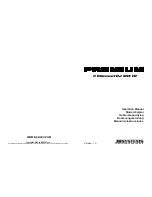
Interrupter/Operator Description
7
Vacuum Interrupters
The operating principle of the 3AH vacuum interrupter is
simple. Figure 3 is a cutaway view of a typical vacuum
interrupter. The entire assembly is sealed after a vacuum
is established. The interrupter stationary contact is con-
nected to the upper disconnect stud of the circuit breaker.
The interrupter movable contact is connected to the lower
disconnect stud and driving mechanism of the circuit
breaker. The metal bellows provides a secure seal around
the movable contact, preventing loss of vacuum while per-
mitting vertical motion of the movable contact.
Figure 3. Cutaway View of Vacuum Interrupter
When the two contacts separate, an arc is initiated which
continues conduction up to the following current zero. At
current zero, the arc extinguishes and any conductive metal
vapor which has been created by and supported the arc
condenses on the contacts and on the surrounding vapor
shield. Contact materials and configuration are optimized
to achieve arc motion and to minimize switching distur-
bances.
Figure 4. Interrupter / Operating Mechanism Module
Primary Disconnects (Figure 4)
Figure 4 illustrates the pad provision to accept the pri-
mary disconnects. Each circuit breaker has three upper
and three lower primary disconnect pad provisions, to
perform the connection to the switchgear.
Phase Barriers
Plates of glass polyester insulating material are attached
to the circuit breaker and provide suitable electrical insu-
lation between the vacuum interrupter primary circuits and
the housing.
Stored Energy Operating Mechanism
The stored energy operating mechanism of the 3AH cir-
cuit breaker is an integrated arrangement of springs, sole-
noids and mechanical devices designed to provide a num-
ber of critical functions. The energy necessary to close
and open the contacts of the vacuum interrupters is stored
in powerful tripping and closing springs. These springs
are normally charged automatically, but there are provi-
sions for manual charging. The operating mechanism that
controls charging, closing and tripping functions is fully
trip-free, i.e., spring charging does not automatically
change the position of the primary contacts, and the clos-
ing function may be overridden by the tripping function at
any time
Interrupter/Operator Module
The interrupter/operator module consists of the three poles,
each with its vacuum interrupters and primary insulators,
mounted on the common motor or manually charged
spring stored energy operating mechanism housing. This
module is shown in Figure 4.
Figure 3. Cutaway View of Vacuum Interrupter









































